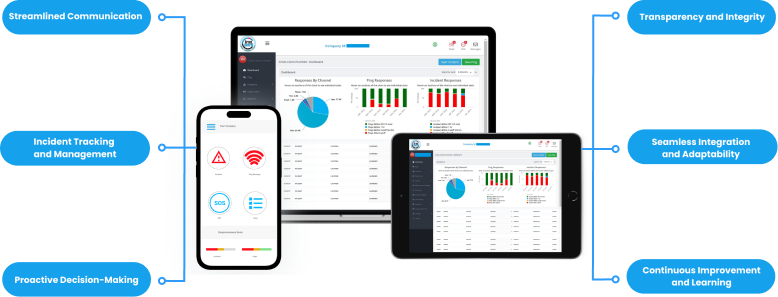Picture this: It’s a typical day at the office, and everything seems to be running smoothly until an unexpected crisis strikes, sending shockwaves through your organisation. From unforeseen disasters to reputation-threatening incidents, navigating through turbulent times can be daunting for business owners and employees alike. However, fear not, for amidst the chaos lies a beacon of hope: effective crisis management strategies.
In this blog, we delve into the essential components of crisis management, offering insights and practical tips to help businesses weather the storm with resilience and grace. From assembling a dedicated crisis management team to harnessing the power of transparent communication, discover how proactive preparation and decisive action can transform crises into opportunities for growth and strength.
Understanding Crisis Management
Crisis management entails the process of anticipating, addressing, and recuperating from unforeseen events jeopardising an organisation’s functionality, reputation, or financial health. It encompasses a holistic approach comprising:
- Prevention: Identifying potential hazards and proactively implementing measures to mitigate them.
- Preparation: Formulating a crisis management plan and establishing clear communication channels.
- Response: Taking decisive action to contain the crisis and limit its repercussions.
- Recovery: Restoring normalcy, rebuilding trust, and gleaning valuable insights from the ordeal.
Strategies for Effective Crisis Management
While the nature of crises may vary, certain fundamental strategies can help steer you through any tumultuous scenario:
1. Forge a Robust Crisis Management Team
Establish a dedicated crisis management team comprising individuals with diverse proficiencies spanning communications, legal acumen, human resources, and operations. This team should spearhead the development and execution of the crisis management plan, as well as making pivotal decisions during crises.
2. Conduct Routine Risk Assessments
Proactive risk assessment is paramount for identifying potential threats and vulnerabilities. Regularly scrutinise your operations, pinpoint potential risks, and devise contingency plans to address them. This proactive stance can avert crises or mitigate their impact.
3. Craft a Concise Communication Strategy
Clear and coherent communication is pivotal during crises. Develop a communication blueprint delineating spokespersons for the organisation, the information to be disseminated, and the dissemination channels. This blueprint should encompass protocols for addressing media inquiries and assuaging public concerns.
4. Embrace Transparency and Authenticity
Transparency and authenticity are linchpins for maintaining public trust during crises. Be forthright and candid about the situation, even if the news is unfavourable. Eschew embellishments or obfuscations. Assume accountability for your actions and evince genuine commitment to redressing the issue.
5. Act Swiftly and Resolutely
Time is of the essence during crises. Refrain from awaiting unfolding developments before taking action. Promptly convene your crisis management team, assess the situation, and devise a response strategy. Swift action underscores your command of the situation and your resolve to address the issue.
6. Harness Technological Tools
Technology can be a potent ally in crisis management. Leverage communication platforms like social media and email to disseminate updates and engage stakeholders. Crisis management software can facilitate streamlined communication, media coverage tracking, and sentiment monitoring.
7. Engage in Continuous Learning
Every crisis offers a fertile ground for learning and growth. Post-crisis, conduct a thorough debrief to pinpoint areas where your response could have been more robust. Utilise these insights to refine your crisis management plan and fortify your preparedness for future exigencies.
By embracing these effective crisis management strategies, businesses can bolster their resilience and navigate adversity with confidence. Crises Control stands at the vanguard of crisis management solutions, offering a comprehensive suite of services to aid organisations in preparation, response, and recovery from crises.
Additional Insights for Effective Crisis Management
- Regularly practise your crisis management plan through drills and simulations to ensure your team is primed to respond effectively in real-world crises.
- Invest in crisis management training for your workforce to equip them with the requisite knowledge and skills for adept crisis handling.
- Monitor social media and news outlets vigilantly to stay abreast of potential threats and emerging issues impacting your business.
- Cultivate robust relationships with key stakeholders such as media outlets, government agencies, and industry partners. These relationships can prove invaluable during crises.
Enhancing Crisis Management with Crises Control

Streamlined Communication
- Crises Control provides a centralised platform for communication during crises, ensuring that all stakeholders are promptly informed and updated.
- Customisable notification systems allow for targeted messaging to specific teams or individuals, enabling swift coordination and response.
Incident Tracking and Management
- The platform facilitates comprehensive incident tracking, allowing organisations to monitor the progression of crises in real-time.
- With built-in incident management features, Crises Control enables teams to assign tasks, track progress, and collaborate effectively to resolve crises efficiently.
Proactive Decision-Making
- Crises Control equips organisations with real-time data analysis capabilities, enabling informed decision-making based on accurate insights.
- Pre-configured response plans and workflows streamline decision-making processes, empowering teams to act decisively in the face of adversity.
Transparency and Integrity
- By promoting transparency and accountability, Crises Control helps organisations maintain trust and credibility with stakeholders during crises.
- The platform’s audit trail and reporting features ensure transparency in crisis response efforts, fostering confidence among internal and external stakeholders.
Seamless Integration and Adaptability
- Crises Control seamlessly integrates with existing systems and processes, minimising disruption and maximising efficiency during crisis response.
- The platform’s adaptable features allow organisations to tailor crisis management workflows to their unique needs and requirements, ensuring flexibility and scalability.
Continuous Improvement and Learning
- Crises Control facilitates post-crisis debriefs and analysis, enabling organisations to identify areas for improvement and implement corrective measures.
- With a focus on continuous learning and refinement, Crises Control helps organisations strengthen their crisis management strategies and enhance overall resilience.
By leveraging the capabilities of Crises Control, organisations can optimise their crisis management efforts, proactively address challenges, and safeguard their long-term success without resorting to overt sales tactics.
Conclusion
In conclusion, effective crisis management strategies are indispensable in today’s dynamic business landscape. From proactive risk assessment to transparent communication and swift response, the outlined strategies serve as pillars for navigating crises with resilience and integrity. By embracing these principles, businesses can not only mitigate the impact of crises, but also emerge stronger, fortified by the lessons learned and the trust retained.
Ready to fortify your organisation against unforeseen challenges? Contact us today to connect with an expert and explore how Crises Control can empower your business with comprehensive crisis management solutions. Let’s navigate the storms together, ensuring your enterprise thrives amidst uncertainty.
Request a Free Demo
Interested in our Crisis Management Solutions?
FAQs
1. Why is crisis management important for businesses?
Crisis management is crucial for businesses, because it helps them anticipate, respond to, and recover from unexpected events that could jeopardise their operations, reputation, or financial stability. By having a well-defined crisis management plan in place, businesses can minimise the negative impact of crises and maintain trust with stakeholders.
2. What are the key components of crisis management?
The key components of crisis management include prevention, preparation, response, and recovery. Prevention involves identifying potential risks and taking proactive measures to mitigate them. Preparation entails developing a crisis management plan and establishing clear communication protocols. Response involves taking decisive action to contain the crisis and minimise its impact, while recovery focuses on restoring normalcy, rebuilding trust, and learning from the experience.
3. How can businesses improve their crisis management strategies?
Businesses can improve their crisis management strategies by assembling a dedicated crisis management team with diverse expertise, conducting regular risk assessments to identify potential threats, developing a clear communication strategy, embracing transparency and authenticity, responding quickly and decisively to crises, leveraging technology, and continuously learning and refining their crisis management plan based on past experiences.
4. What role does Crises Control play in enhancing crisis management efforts?
Crises Control is a platform that can significantly bolster an organisation’s crisis management efforts. It provides features such as streamlined communication during crises, customisable notification systems, comprehensive incident tracking and management, real-time data analysis for informed decision-making, transparency and accountability tools, seamless integration with existing systems, and continuous improvement and learning capabilities.
5. How can businesses ensure their crisis management strategies remain effective over time?
To ensure their crisis management strategies remain effective over time, businesses should regularly review and update their crisis management plans, conduct ongoing training and drills to keep their teams prepared, stay informed about emerging threats and trends through monitoring social media and news outlets, cultivate strong relationships with key stakeholders, and remain agile and adaptable in their response to changing circumstances.








